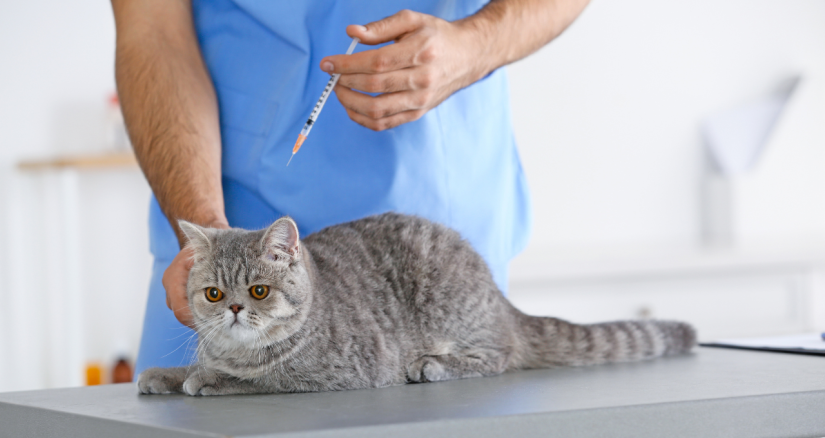
Understanding Diabetes in Dogs and Cats: Managing the Silent Epidemic
Diabetes is not just a disease that affects humans; it can also occur in our beloved pets. Dogs and cats can develop diabetes, a chronic condition that affects their ability to regulate blood sugar levels. As pet owners, it is prudent to be aware of the signs, causes, and management strategies for diabetes in our furry friends. We will look at the key aspects of diabetes in dogs and cats, empowering owners to provide the best care for their diabetic pet.
What is Diabetes?
Diabetes (specifically diabetes mellitus) is a disease that occurs when the pancreas does not produce enough insulin (insulin deficient), or the body is not responding normally to the insulin that is being produced (insulin resistance). Sugar is the preferred energy source for most of our body’s cells, and insulin is a hormone that helps the body utilize sugar for energy. So, when there is not enough insulin, the sugar in blood is not being used, and the body feels like it needs to intake more energy. It is important to note that dogs and cats are affected by different types of diabetes. Dogs tend to develop type I diabetes, which means their pancreas don’t produce enough insulin whereas cats tend to develop type II diabetes, which means their bodies aren’t responding normally to the insulin that is being produced.
Recognizing the Signs of Diabetes
It's important to be vigilant and watch for signs that may indicate diabetes in pets. Common symptoms include increased thirst and urination, weight loss despite a good appetite, increased hunger, lethargy, cloudy eyes (in dogs), and recurrent infections.1 If one notices any of these signs, consult a veterinarian for a proper diagnosis.
Causes and Risk Factors
The exact cause of diabetes in dogs and cats is not always clear, but several factors can contribute to its development. These include genetic predisposition, obesity, hormonal disorders, pancreatitis, certain medications, and autoimmune conditions. Age and breed can also play a role, with dogs diagnosed at around 7-10 years of age and cats usually older than 6, as well as certain breeds, being more prone to diabetes.2
Diagnosis and Veterinary Care
If diabetes is suspected, a veterinarian will conduct a thorough examination and run blood and urine tests to confirm the diagnosis. Diabetes is typically confirmed when hyperglycemia (high blood sugar) and high glucose in the urine is discovered.
Treatment Options
Diabetes in pets is a manageable condition, and treatment typically involves a combination of insulin therapy, dietary management, and exercise. Dietary modifications, such as a high-fiber and low-carbohydrate diet, can also aid in glucose control. This is particularly useful in cats, 90% of whom have Type II diabetes, and insulin use may be reduced or even eliminated with proper dietary modifications.3 Regular exercise helps maintain a healthy weight and improves insulin sensitivity. Insulin injections, tailored to a pet's specific needs, help regulate blood sugar levels. A veterinarian will guide an owner on proper administration techniques. Monitoring a pet's blood glucose levels is crucial, and a vet may recommend a glucose curve, which involves measuring blood glucose levels at regular intervals throughout the day. Regular veterinary check-ups are essential to evaluate a pet's overall health and adjust treatment if needed.
Blood Glucose Monitoring at Home
Monitoring a pet's blood glucose levels at home may be a helpful part of diabetes management. A veterinarian may show an owner how to perform at-home blood glucose testing using a glucometer and provide guidance on the ideal target range for a pet. Regular monitoring enables owners to identify patterns and report any changes to their veterinarian.
Importance of Consistency
Consistency is key when managing diabetes in pets. Stick to a consistent diet, and feeding schedule, administer insulin at the same time each day, and maintain a stable exercise routine. Consistency helps regulate blood sugar levels and ensures optimal treatment efficacy.
Regular Veterinary Follow-ups
Regular follow-up appointments with a veterinarian are crucial to assess a pet's response to treatment and make any necessary adjustments. A vet will monitor your pet's weight, perform blood tests, and evaluate overall health. These visits provide an opportunity to address any concerns and ensure a pet's diabetes is well managed.
Managing diabetes in dogs and cats requires dedication and commitment, but with proper care, it is possible for a pet to live a happy and fulfilling life. Recognizing the signs, seeking veterinary care, implementing a comprehensive treatment plan, and maintaining consistent monitoring are essential steps in managing this condition. With love and support, a diabetic pet can thrive and enjoy a high quality of life for years to come.
References
- “Diabetes in Pets | American Veterinary Medical Association.” American Veterinary Medical Association, https://www.avma.org/resources/pet-owners/petcare/diabetes-pets. Accessed 1 Nov. 2023.
- Bruyette, David. “Diabetes Mellitus in Dogs and Cats - Endocrine System - Merck Veterinary Manual.” Merck Veterinary Manual, Merck Veterinary Manual, 3 July 2019, https://www.merckvetmanual.com/endocrine-system/the-pancreas/diabetes-mellitus-in-dogs-and-cats.
- Gottlieb, Susan, and Jacquie Rand. “Managing Feline Diabetes: Current Perspectives.” Veterinary Medicine: Research and Reports, Informa UK Limited, June 2018, pp. 33–42. Crossref, doi:10.2147/vmrr.s125619.
Follow us on LinkedIn for the latest updates on all things happening here at BSM Partners.
About the Author
Dr. Katy Miller works as the Director of Veterinary Services at BSM Partners. She earned her veterinary degree at Ross University and completed her clinical year at Louisiana State University. She previously served for 11 years as the Director of Dog and Cat Health and Nutrition for Mud Bay where she earned multiple certifications and specialized in pet food nutriton, prior to which she practiced general and emergency medicine for seven years. She is also a competitive three-day eventer, licensed falconer, and claims only two (Golden and Mini Doxie) of their nine dogs.
This content is the property of BSM Partners. Reproduction or retransmission or repurposing of any portion of this content is expressly prohibited without the approval of BSM Partners and is governed by the terms and conditions explained here.